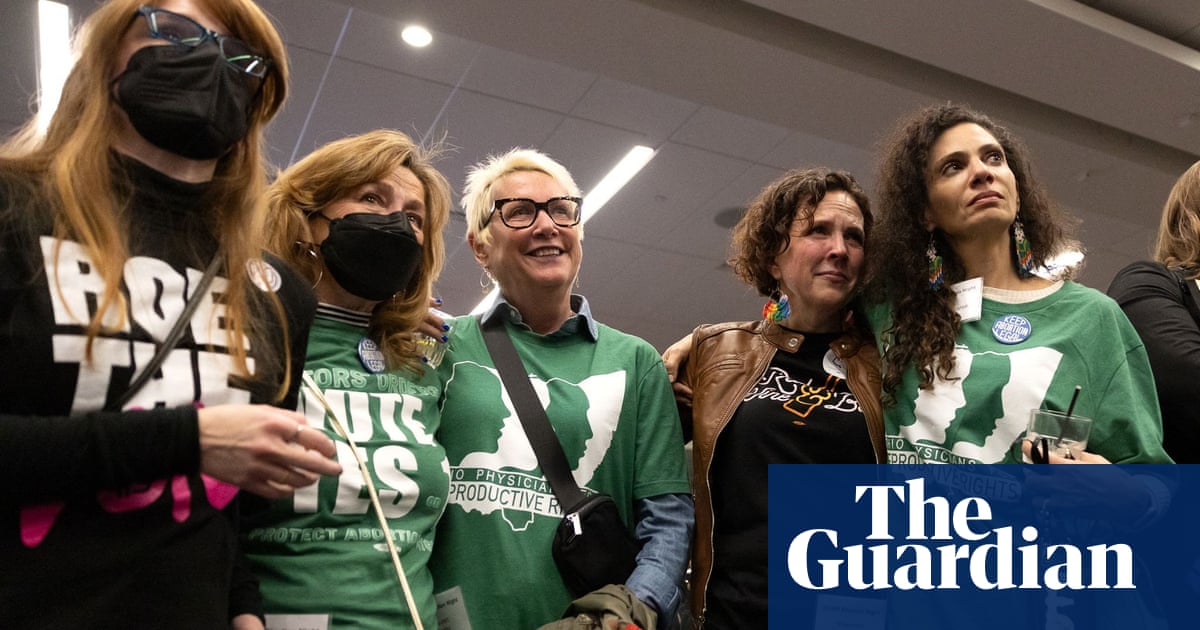
The US Senate on Wednesday failed to advance legislation that would codify the right to an abortion into federal law, after it was blocked by Republicans.
It was a largely symbolic vote by Democrats to mobilize Americans around the issue ahead of a likely supreme court decision striking down the protections enshrined by Roe v Wade.
The Senate roll call was a stark reflection of the partisan divide over abortion rights, with all Republicans and one conservative Democrat, Joe Manchin of Virginia, voting against the measure. The final tally was 49-51, well short of the 60 votes necessary to overcome a filibuster in the Senate.
Kamala Harris, the first woman and woman of color to serve as vice-president, presided over the vote.
“Sadly the Senate failed to stand in defense of a women’s right to make decisions about her own body,” Harris told reporters, after stepping off the dais. Pointing to the onslaught of laws restricting abortion access in Republican-led states, she said “the priority should be to elect pro-choice leaders at the local, the state and the federal level”.
Democrats moved quickly to hold the doomed vote after a leak last week of a draft opinion, written by Justice Samuel Alito in February and confirmed as authentic, indicated that the court’s conservative majority had privately voted to strike down Roe and subsequent rulings. The extraordinary disclosure ignited protests around the country, pushing reproductive rights to the center of the political debate six months before the congressional midterms. A final ruling from the court is expected this summer.
Ahead of the vote, a group of House Democratic women marched across the Capitol to protest against the end of Roe, chanting: “My body, my decision.”
Democrats, under intensifying pressure to act, saw a political opportunity in forcing Republicans to vote against a bill protecting abortion at a moment when the threat to access is urgent and polls show a majority of Americans want the procedure to remain legal in all or some cases.
They hope to use the Republican blockade as a data point in their midterm message to voters: that the GOP has become a party of “ultra-Maga” extremists, on the cusp of fulfilling a decades-long goal to strip women of their reproductive rights.
It is an issue Democrats hope will energize young voters disenchanted by the Biden administration and persuade Republican-leaning suburban women to back them again this cycle.
“If we do not take a stand now to protect a woman’s right to choose, then mark my words, it will be open season, open season on our God-given freedoms,” the Senate majority leader, Chuck Schumer, said in a floor speech ahead of the vote. He called “one of the most consequential we will take in decades”.
If passed, the bill would have codified Roe v Wade into federal law, ensuring the right of healthcare providers to perform abortions and the right of patients to receive them. But it would also go further, in some cases invalidating state-level restrictions on abortion access enacted after the Roe decision in 1973.
As such, Republicans cast the bill as a “radical” attempt to expand reproductive rights that goes far beyond Roe and would legalize “abortion on demand”.
“We will stand with the American people, stand with innocent life, and block the Democrats’ extreme bill,” the Senate minority leader, Mitch McConnell, said on Wednesday.
Republicans are betting the economy will take precedence over abortion this November. Polling shows Republicans are well positioned to make significant gains in the midterm elections, buoyed by historical headwinds, discontent with the party in power and widespread concern over the rising cost of gas, food and rent.
But there are signs that Republicans do worry about a potential political backlash if Roe is overturned and states move swiftly to outlaw abortion, as many are preparing to do.
A day ahead of the vote, McConnell sought to tamp down conservative calls for a nationwide ban on abortion if they take control of the chamber in November, telling reporters: “Historically, there have been abortion votes on the floor of the Senate. None of them have achieved 60 votes.”
The two Senate Republicans who support abortion rights, Susan Collins of Maine and Lisa Murkowski of Alaska, opposed the bill, instead urging support for an alternative measure that they say is tailored to reflect the landscape of abortion rights. But many Democrats see their proposal, which is not expected to receive a vote, as too weak.
“Unlike some far-left activists, Senator Murkowski and I want the law today to be the law tomorrow,” Collins said on Wednesday, objecting to the lack of protections for religious exemptions in the Democrats’ bill.
In a dramatic shift, one of the only other Democrats in Congress with conservative views on abortion rights, Bob Casey of Pennsylvania, said he would support the measure and voted in favor of advancing it. In a statement citing the leaked supreme court ruling, Casey said the “circumstances around the entire debate on abortion” had changed since the last time the Senate voted on the measure.
Without a clear legislative path forward, Democrats are turning to the fall elections, urging Americans to elect them as the “last lines of defense” against the end of Roe.
Abortion is also likely to be a major issue in races for governor and state offices, as the battle lines shift to the states.
The show vote on Wednesday only intensified calls from progressives and abortion rights groups for Democrats to eliminate the filibuster. The long-simmering debate has divided the party, which does not have enough votes to end the rule. It has also energized efforts to reform the supreme court, including controversial proposals such as expanding the number of justices on the bench or imposing term limits.












